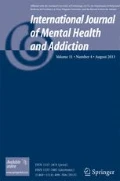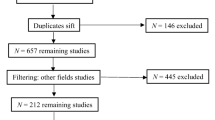Abstract
In 2009, one of the major Dutch addiction care organizations initiated a pilot program to explore the possibility of using an existing Cognitive Behavioral Therapy and Motivational Interviewing based treatment program (‘Lifestyle Training’) to treat internet addiction. The current study evaluates this pilot treatment program by providing a qualitative analysis of the experiences of the therapists with the treatment of 12 self-proclaimed internet addicts. Therapists report that the program, which is ordinarily used for substance dependence and pathological gambling, fits the problem of internet addiction quite well. Interventions mainly focused on controlling and reducing internet use, and involved expanding (real life) social contacts, regaining a proper daily structure, constructive use of free time, and reframing beliefs. Therapists further indicated that the treatment achieved some measure of progress for all of the 12 treated patients, while patients reported satisfaction with the treatment and actual behavioral improvements.
Similar content being viewed by others
References
APA. (2010, February 10). Substance-Related Disorders. American Psychiatric Association - DSM-5 Development. Retrieved February 10, 2010, from http://www.dsm5.org/ProposedRevisions/Pages/Substance-RelatedDisorders.aspx. Accessed: 2010-02-10. (Archived by WebCite® at http://www.webcitation.org/5nR8AitLs).
Beard, K. W., & Wolf, E. M. (2001). Modification in the proposed diagnostic criteria for Internet addiction. Cyberpsychology & Behavior, 4(3), 377–383.
Bernardi, S., & Pallanti, S. (2009). Internet addiction: a descriptive clinical study focusing on comorbidities and dissociative symptoms. Comprehensive Psychiatry, 50(6), 510–516. doi:10.1016/j.comppsych.2008.11.011.
Block, J. J. (2008). Issues for DSM-V: internet addiction. The American Journal of Psychiatry, 165(3), 306–307.
Braun, V., & Clarke, V. (2006). Using thematic analysis in psychology. Qualitative Research in Psychology, 3(2), 77–101. doi:10.1191/1478088706qp063oa.
Breslin, F. C., Sobell, L. C., Sobell, M. B., & Agrawal, S. (2000). A comparison of a brief and long version of the Situational Confidence Questionnaire. Behaviour Research and Therapy, 38(12), 1211–1220. doi:10.1016/S0005-7967(99)00152-7.
Brewer, J. A., & Potenza, M. N. (2008). The neurobiology and genetics of impulse control disorders: relationships to drug addictions. Biochemical Pharmacology, 75(1), 63–75.
Caplan, S. E. (2003). Preference for online social interaction: a theory of problematic internet use and psychosocial well-being. Communication Research, 30(6), 625–648. doi:10.1177/0093650203257842.
De Wildt, W. (2000). Leefstijltraining 2. Handleiding voor de trainer [Lifestyle training 2. Trainer’s manual]. Nijmegen: Cure & Care.
De Wildt, W. (2010). Alcohol dependence, treatment effectiveness and the concept of craving [PhD thesis]. Amsterdam: University of Amsterdam.
Du, Y., Jiang, W., & Vance, A. (2010). Longer term effect of randomized, controlled group cognitive behavioural therapy for Internet addiction in adolescent students in Shanghai. The Australian and New Zealand Journal of Psychiatry, 44(2), 129–134.
Erlandson, D. A., Harris, P. E. L., Skipper, B. L., & Allen, S. D. (1993). Doing naturalistic inquiry: A guide to methods. Newbury Park, CA: Sage Publications.
Hussain, Z., & Griffiths, M. D. (2009). The attitudes, feelings, and experiences of online gamers: a qualitative analysis. Cyberpsychology & Behavior, 12(6), 747–757. doi:10.1089/cpb.2009.0059.
Marlatt, G. A., & Donovan, D. M. (2005). Relapse prevention: Maintenance strategies in the treatment of addictive behaviors. New York: Guilford Press.
Meerkerk, G. J. (2007). Pwned by the internet, Explorative research into the causes and consequences of compulsive internet use [PhD thesis]. Rotterdam: Erasmus University Rotterdam.
Meerkerk, G. J., Van Rooij, A. J., Amadmoestar, S. S., & Schoenmakers, T. M. (2009a). Nieuwe Verslavingen in Zicht. Een Inventariserend Onderzoek naar Aard en Omvang van ‘Nieuwe Verslavingen’ in Nederland [New Addictions in Sight! A Survey into the Nature and Prevalence of “New Addictions” in the Netherlands] (IVO Reeks No. 63). Rotterdam: IVO. Retrieved from http://bit.ly/98vABT.
Meerkerk, G. J., Van den Eijnden, R. J. J. M., Vermulst, A. A., & Garretsen, H. F. L. (2009b). The Compulsive Internet Use Scale (CIUS): some psychometric properties. Cyberpsychology & Behavior, 12(1), 1–6. doi:10.1089/cpb.2008.0181.
Miller, W. R., & Rollnick, S. (2002). Motivational interviewing: Preparing people for change (2nd ed.). New York: Guilford Press.
Monti, P. M. (2002). Treating alcohol dependence: A coping skills training guide. New York: The Guilford Press.
Oudejans, S. (2009). Routine outcome monitoring and learning organizations in substance abuse treatment. Amsterdam: University of Amsterdam.
Potenza, M. N. (2006). Should addictive disorders include non-substance-related conditions? Addiction, 101(s1), 142–151.
Rollnick, S., & Allison, J. (2004). Motivational interviewing. In N. Heather & T. Stockwell (Eds.), The essential handbook of treatment and prevention of alcohol problems (pp. 105–116). West Sussex: Wiley.
Science. (2010). Psychiatry. DSM-V at a Glance. Science, 327(5967), 770. doi:10.1126/science.327.5967.770-b.
Tao, R., Huang, X., Wang, J., Zhang, H., Zhang, Y., & Li, M. (2010). Proposed diagnostic criteria for internet addiction. Addiction, 105(3), 556–564. doi:10.1111/j.1360-0443.2009.02828.x.
Wood, R. (2008). Problems with the concept of video game “Addiction”: some case study examples. International Journal of Mental Health and Addiction, 6(2), 169–178.
Acknowledgements
The authors thank the Volksbond Foundation Rotterdam for financial support of the project. The therapists are thanked for their contribution to the treatment, the evaluation meetings, and their critical reading the results section of this manuscript. Additionally, we would like to thank Cas Barendregt from the IVO Addiction Research Institute for his advice and practical support. Finally, we thank Nicholas Caruana and Samantha Flood for proofreading the document.
Disclosure Statement
Authors have no conflict of interest. Authors have full control of the primary data, which are available to review if requested.
Author information
Authors and Affiliations
Corresponding author
Rights and permissions
About this article
Cite this article
van Rooij, A.J., Zinn, M.F., Schoenmakers, T.M. et al. Treating Internet Addiction With Cognitive-Behavioral Therapy: A Thematic Analysis of the Experiences of Therapists. Int J Ment Health Addiction 10, 69–82 (2012). https://doi.org/10.1007/s11469-010-9295-0
Published:
Issue Date:
DOI: https://doi.org/10.1007/s11469-010-9295-0




